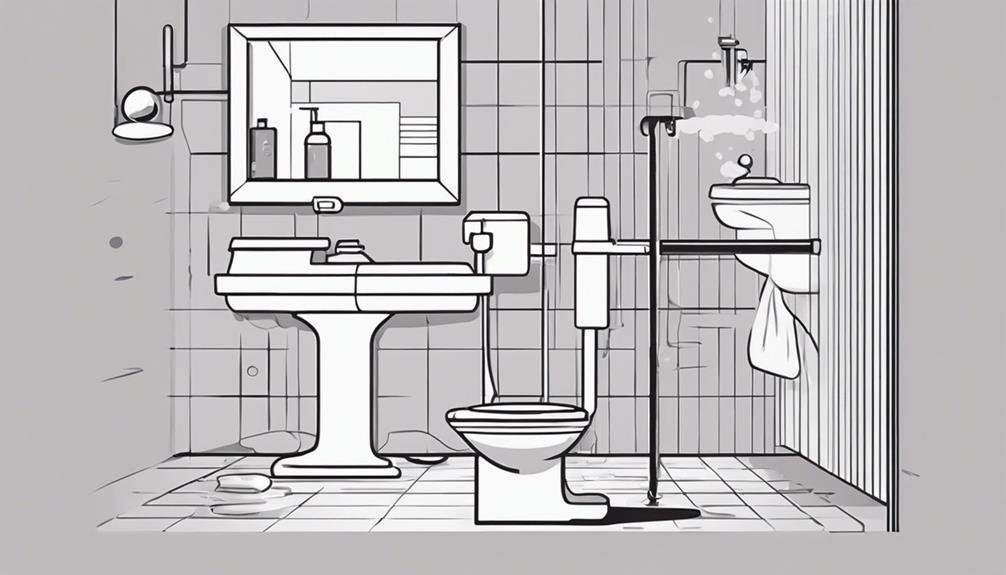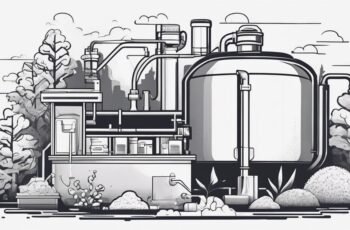If you've ever experienced a foul odor lingering around your septic tank, you know how unpleasant it can be. But fret not, there are practical steps you can take to tackle this issue effectively.
By following seven essential tips, you can ensure that your septic tank remains odor-free and in good working condition. From establishing a regular pumping schedule to implementing proper waste disposal practices, each tip plays a crucial role in maintaining your septic system.
Stay tuned to learn how these simple yet vital strategies can make a significant difference in your septic tank maintenance.
Key Takeaways
- Regular septic tank pumping every 3-5 years prevents odors and backups.
- Responsible waste disposal and septic-safe products are crucial for odor prevention.
- Inspect for leaks regularly to avoid foul odors and system contamination.
- Professional inspections every 3-5 years ensure optimal system health and prevent costly repairs.
Regular Pumping Schedule

To maintain optimal septic tank performance and prevent odors, adhere to a regular pumping schedule. The pumping frequency for septic tanks typically ranges from every three to five years, but this can vary based on factors such as household size, water usage, and tank size.
By sticking to a routine pumping schedule, you ensure that solids are effectively removed, preventing clogs and backups that can lead to foul odors. It's crucial to be mindful of maintenance reminders and not delay pumping beyond the recommended timeline.
Proper septic care involves proactive measures to avoid costly repairs and unpleasant smells. Neglecting your septic system can result in issues like odors seeping into your home or yard, indicating a potential malfunction.
Proper Waste Disposal
Proper waste disposal plays a crucial role in maintaining a healthy and odor-free septic system. Effective waste management is essential for preventing odors and keeping your septic tank functioning properly. To achieve this, it's important to avoid flushing non-biodegradable items such as sanitary products, wipes, or grease down the drains. These items can cause clogs and disrupt the natural breakdown of waste within the septic system, leading to unpleasant odors.
Additionally, be mindful of what goes into your garbage disposal, as large food scraps can also contribute to blockages and foul smells.
Regularly monitoring your waste disposal habits can significantly impact odor prevention in your septic system. By practicing proper waste management techniques, you can ensure that your septic tank operates efficiently and remains odor-free. Remember, responsible waste disposal is key to maintaining a healthy septic system and a pleasant environment for your home.
Use Septic-Safe Products

When selecting cleaning or household products for use in your home, always ensure they're labeled as septic-safe to prevent any harm to your septic system. Using non-septic-safe products can introduce harmful chemicals that disrupt the natural balance within your septic tank, leading to potential issues and odors. To maintain a healthy septic system, consider the following:
- Chemical Additives: Avoid products containing harsh chemicals like bleach, ammonia, or antibacterial agents. These can kill beneficial bacteria in your septic tank, disrupting the breakdown of waste and causing odors.
- Natural Alternatives: Look for eco-friendly and biodegradable options that are gentle on your septic system. Products labeled as natural or organic are often safer choices that won't harm the delicate ecosystem of your septic tank.
- Read Labels Carefully: Take the time to review product labels and look for specific mentions of being septic-safe. This simple step can go a long way in preserving the health and functionality of your septic system.
Inspect for Leaks
Inspecting your septic tank for leaks is crucial to prevent foul odors and contamination. Identify any possible leaks by checking for wet spots, pooling water, or unusually lush patches of grass around the tank.
Promptly repair any leaks you find to maintain the integrity and efficiency of your septic system.
Identify Possible Leaks
To find potential leaks in your septic tank system, thoroughly examine all visible components for any signs of moisture or seepage. Start by checking the tank, pipes, and drain field for any visible leaks or damp areas. Here are some key points to consider when identifying possible leaks:
- Look for wet spots around the tank or drain field.
- Check for any foul odors that may indicate a leak.
- Inspect the ground for unusually lush or green patches, which could signal a leak in the system.
Repair Any Leaks Promptly
Upon identifying any leaks in your septic tank system, immediate repair is crucial to prevent further issues and maintain proper functionality. Leak detection can be done by checking for soggy areas, unusually lush grass, or foul odors in the vicinity of the tank.
It's important to address leaks promptly to prevent groundwater contamination and the potential for system failure. Leak prevention measures include regular inspections, maintaining proper tank levels, and ensuring all connections are secure.
Ignoring leaks can lead to costly repairs and environmental hazards. By staying vigilant and proactive in addressing any leaks, you can prolong the lifespan of your septic system and avoid unpleasant odors or backups in your home.
Maintain Drainage Field

To maintain your drainage field effectively, make sure to inspect it regularly for any signs of clogs.
Planting grass cover crops can help in preventing soil erosion and keeping the drainage field functioning optimally.
Inspect Regularly for Clogs
Regularly inspecting your septic system for clogs is essential to maintain the drainage field's proper function and prevent odors. Start by checking for any signs of blockages in the pipes or tank. Use a flashlight to look for standing water or slow drainage in sinks and toilets. Additionally, listen for gurgling sounds when water is draining. To ensure optimal performance, schedule periodic professional inspections to detect potential clogs early on. Remember, early detection can save you from costly repairs and unpleasant odors.
- Signs of Blockages: Check for standing water or slow drainage.
- Listen for Gurgling Sounds: Be attentive when water is draining.
- Professional Inspections: Schedule regular inspections for early detection.
Plant Grass Cover Crops
Consider implementing grass cover crops to maintain the drainage field of your septic system effectively.
Planting grass cover crops is beneficial for soil health and nutrient management in the drainage field. These crops help prevent erosion, improve soil structure, and enhance water infiltration, reducing the risk of drainage field issues.
Grass cover crops also absorb excess nutrients, such as nitrogen, from the soil, preventing them from leaching into the groundwater and potentially contaminating it.
By promoting a healthy soil environment, grass cover crops support the growth of beneficial microorganisms that aid in breaking down organic matter and treating wastewater effectively.
Regularly planting and maintaining grass cover crops can significantly contribute to the longevity and efficiency of your septic system's drainage field.
Control Grease Buildup
To effectively prevent septic tank odors, ensure that you actively monitor and eliminate grease buildup in your system. Grease traps play a crucial role in capturing fats, oils, and grease before they enter your septic system, preventing blockages and foul odors. Proper maintenance of these traps is essential for the overall health of your system.
Additionally, adopting good kitchen habits can significantly reduce the amount of grease that ends up in your septic tank. Avoid pouring cooking oils down the drain and scrape plates into the trash before washing dishes to minimize grease entering the system. Regularly cleaning grease traps and being mindful of what goes down your drains can go a long way in controlling grease buildup and maintaining a healthy septic tank.
- Regularly clean and maintain grease traps to prevent clogs and odors.
- Avoid pouring cooking oils and fats down the drain to reduce grease entering the system.
- Scrape plates and cookware into the trash before washing to minimize grease buildup in the septic tank.
Consider Professional Inspections

Ensure professional inspections of your septic system to detect potential issues early and maintain its optimal functioning. Professional inspections are crucial for septic system health. The frequency of inspections varies but generally, it's recommended to have a professional inspection every 3-5 years. The cost of a professional inspection may range from $200 to $500, depending on various factors such as the size of the tank and the complexity of the system.
DIY inspections can be tempting to save money, but professionals have the expertise and tools to identify problems that untrained individuals might miss. They can also provide recommendations on how to address any issues found during the inspection. While DIY inspections can be done more frequently, they shouldn't replace the need for periodic professional inspections.
Professional inspections offer peace of mind and can prevent costly repairs down the line. Invest in the health of your septic system by scheduling regular professional inspections.
Conclusion
In conclusion, maintaining your septic tank is crucial for preventing odors and ensuring proper functioning.
Did you know that a well-maintained septic system can last up to 30 years, while a neglected one may need costly repairs or replacement in as little as 5 years?
By following these essential tips and staying on top of maintenance, you can avoid unpleasant odors and costly repairs in the long run.
Don't wait until it's too late – start taking care of your septic system today.

